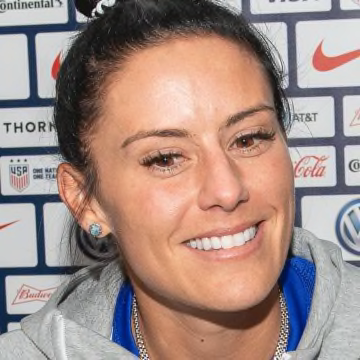MVP Moms with Ali Krieger
In life’s biggest moments, Ali Krieger is encouraged by her mom to put happiness first.

U.S. Women's National Team
American defender Ali Krieger appeared in more than 100 games (as a right back and a center back) with the U.S. women’s national team. She made her national team debut in 2008 and has played for the U.S. at three FIFA World Cups (2011, 2015 and 2019). She played all 600 minutes in the 2011 tournament, when the U.S. lost in the final to Japan, and she played all but 10 minutes in the 2015 World Cup, when Team USA won the tournament. She was an alternate on the team that won gold at the 2008 Summer Olympics, and was a member of the team that failed to medal at the 2016 Summer Games. A native of Dumfries, Va., Krieger was inspired to play soccer as a child by her older brother, Kyle. She played in college at Penn State, where she won four straight Big Ten championships with the Nittany Lions. A two-time All-America, she started 87 games in four years at Penn State, scoring 11 goals. After leaving State College, Krieger played in Germany for FFC Frankfurt. She spent six years in Germany, from 2007 to 2013, winning the UEFA Women’s Champions League in 2008. She returned to the U.S. to play in the NWSL for the Washington Spirit in 2013. She has also played in the league for the Orlando Pride and the NY/NJ Gotham.
In life’s biggest moments, Ali Krieger is encouraged by her mom to put happiness first.
Female athletes have a lot of unique considerations when it comes to their bodies and performance — from menstruation to hair to body image.
Endorsements and sponsorships for athletes are critical to overall visibility and livelihood. But for women, the stakes are different.
Female athletes across all sports are fighting for equitable treatment now. But what’s next for women in sports?
Female athletes come together for an honest conversation.
You can’t be what you can’t see. These five women get real about their own experiences with representation and race.
Mental health is just as critical as physical health. And female athletes deserve the same access to mental health resources.
The USWNT lawsuit, the WNBA’s new CBA, a lack of resources and salaries. Let’s just say … they went there.
We’re safe, we’re healthy, we’re sane, we’re in a good spot mentally and physically, so we’re doing O.K.
I’d run through a brick wall if I needed to. And celebrating with this team — this family! — after we secured that World Cup trophy is something I’ll remember f